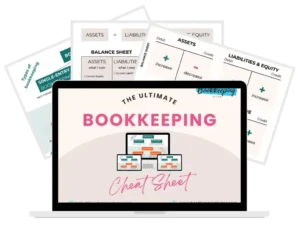The straightforward answer is no, it’s not difficult at all … but you need to know what you’re doing.
Why would you want to do your own bookkeeping?
- Starting a new business comes with its own set of challenges, from introducing and marketing your business to attracting your first customers. You’ve invested quite a bit already. Hiring a bookkeeper when you hardly make any money … well, managing your own books to save money makes sense in this scenario.
- Various “user-friendly” accounting software options claim to make bookkeeping a breeze (…or not … but let’s put this aside for a moment). Nonetheless, bookkeeping isn’t an overly complex task, especially in the early stages when there are few business transactions.
- If you’re anything like me and you are a big fan of DIY, why outsource when you can do it yourself? Don’t misunderstand me – I’m not sarcastic at all. I truly believe that if you’re a DIY type of person, it’s better you start doing your own books. Embracing the DIY approach allows you to understand the process and decide later whether to continue managing your books or delegate the bookkeeping to an external bookkeeper.
- Taking charge of your bookkeeping provides a sense of control … immensely! You won’t have to rely on external parties to complete your accounts. By recording the business transactions yourself, you can easily access all financial reports when needed and you don’t have to question any line items. You know exactly what’s behind the numbers.
What does it take to do your own bookkeeping?
Understanding the basics
First and foremost, you need to be familiar with fundamental bookkeeping principles. There’s no workaround for this.
I’m not saying you need to master the concept of “debits and credits” – fortunately, using accounting software doesn’t require it anymore. But understanding the basics like the difference between revenue and profit, assets and liabilities, business and personal expense, and whether you expense or capitalise a purchase is crucial.
No fear of numbers
Since bookkeeping involves calculations and numerical data, it’s essential to be at ease with math.
Hence, if numbers trigger anxiety or were challenging for you in the past, …well, my fiend, it might be best to avoid managing your business’s bookkeeping.
Eye for Detail
This is non-negotiable. Accuracy is paramount in bookkeeping. It’s not okay to have a “more or less” good figure in. It’s not acceptable if the results are “close enough”.
In bookkeeping, every cent must be accurately accounted for. Even small discrepancies can cause you major issues down the line. Remember: your financial statements are only as reliable as the data you input.
Organizational Skills
Keeping meticulous records helps in tracking transactions and simplifies financial reporting, and eases tax filing. Establishing and maintaining organized documenting, filing, and archiving systems is crucial when handling your own bookkeeping.
Commitment
Bookkeeping is a repetitive task that demands dedication. Do you have a low-ticket product, and you sold 1000s of them in a month? This means that you have thousands of payments to record. Of course, automation is your friend, but even then, it takes willpower to sit down and process numerous unreconciled transactions.
As an entrepreneur, you might find yourself spending hours sorting through receipts, invoices, and bank statements. This can be particularly overwhelming in the early stages of your business when you are trying to juggle multiple roles.
Staying committed to consistently updating records is key. Skipping bookkeeping tasks can lead to a mounting backlog, making it challenging to catch up. Be ready to dedicate time regularly to managing your bookkeeping effectively.
What are the challenges of doing your own bookkeeping?
1. It can be a grind: Bookkeeping is occasionally tedious and monotonous. Especially when you’re in the beginning phase of the learning curve.
2. Staying compliant: it gets a bit tricky when you begin hiring employees and need to do payroll. It’s essential to invest time in understanding deductions and reporting requirements. Equally challenging is ensuring accurate tax calculations: knowing what you can claim and what you cannot. Remember, the accuracy of tax reports generated by accounting software relies on the input data provided. If the initial coding is inaccurate, the resulting output will be affected as well.
3. Unusual transactions: Occasionally, you may encounter transactions that don’t fit neatly into your standard categories. Figuring these out can be a mini-project on its own, requiring extra time and effort.
4. Prioritization: as a business owner, bookkeeping often falls to the bottom of your to-do list.
It’s more important to respond to a client, learn about new client acquisition strategies, or create a new Instagram post than to process the outstanding transactions.
Key takeaway
So, while DIY bookkeeping is certainly manageable for a business owner, it’s important to weigh the pros and cons. It’s not just about saving money. It’s about taking control and truly understanding the financial aspects of your business. But you need to stay committed and prioritize doing bookkeeping to keep on top of your tasks.
Are you ready to dive in, or is it something you’d prefer to delegate? Either choice is perfectly valid; what matters is what works best for you and your business.
I believe in You: you’re a champion 🏆

Bookkeeping basics
at your fingertip
Download the FREE Ultimate Bookkeeping Cheat Sheet so that you never ever feel confused about the basic bookkeeping principles!




